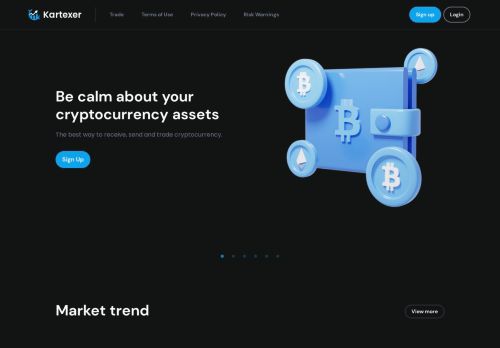Kartexer Review
Beware Investors Kartexer – Regarding registration of issuance, offer or sale of securities/derivatives, and reporting requirements

Who is:
In the bustling landscape of online trading, understanding the entity behind a platform is paramount. Kartexer, founded in 2019, projects itself as a global player based in St. Vincent and the Grenadines. However, despite the bold claims of a user-friendly interface and advanced features, the platform remains shrouded in mystery regarding its ownership structure. The lack of transparency raises legitimate concerns about accountability and reliability, leaving potential investors in the dark about the individuals steering the platform and their track record in the industry.
Regulation:
Regulatory compliance forms the bedrock of a trustworthy trading platform. Kartexer, unfortunately, stands on shaky ground in this aspect. While it tempts users with the allure of freedom from regulatory constraints, this very freedom exposes investors to a myriad of risks. Operating without oversight from entities like ASIC, FCA, or CySEC means Kartexer can potentially engage in nefarious activities, from manipulating asset prices to denying withdrawals without justification. The absence of a valid license in the countries where it operates places users in legal jeopardy, with potential tax issues and penalties looming.
Location:
The choice of Kartexer’s headquarters in St. Vincent and the Grenadines, a known offshore haven, adds another layer of complexity for potential investors. This jurisdiction, celebrated by entities seeking to evade regulation and taxation, raises red flags regarding the platform’s commitment to transparency and accountability. The weak financial service laws and consumer protection measures in this location amplify the challenges users might face in pursuing legal action or recovering funds if complications arise.
Services:
Kartexer markets an enticing array of services, promising over 250 assets, low fees, high leverage, and a plethora of payment methods. However, beneath the veneer of these offerings lies a lack of transparency and verifiable proof. The platform’s refusal to disclose exact fees raises questions about the true cost of transactions, creating an environment of uncertainty for traders. Claims of high leverage up to 1:1000, without clear risk mitigation strategies, pose significant risks. Additionally, social trading and copy trading features lack credibility, potentially exposing users to unqualified or fraudulent traders.
Reviews:
User experiences are a vital gauge of a platform’s credibility, and Kartexer’s reputation is marred by a slew of negative reviews across various platforms. Traders expressing frustration over withdrawal difficulties, poor customer service, false advertising, technical glitches, and financial losses due to faulty signals or advice paint a disconcerting picture. Authentic experiences shared by users serve as a stark warning for potential investors, emphasizing the importance of thorough scrutiny and due diligence.
Customer Service:
A platform’s customer service is the frontline for users navigating the complexities of online trading. Kartexer’s claims of a professional and responsive team available 24/7 fall short in the face of numerous user experiences. Reports of extended waiting times, unhelpful agents, language barriers, and unresolved issues reveal a significant discrepancy between promised and actual customer service quality. In an industry where quick and reliable support is essential, Kartexer’s shortcomings in this area pose serious concerns.
Why Check Company Credentials:
The importance of scrutinizing a trading platform’s credentials cannot be overstated. Kartexer’s lack of regulation, opaque ownership structure, and absence of a valid operating license highlight the necessity for potential investors to conduct due diligence. Checking a company’s credentials not only ensures adherence to industry standards but also serves as a layer of protection for users’ funds. Opting for a regulated platform under the oversight of entities like ASIC, FCA, or CySEC provides a more secure and reliable trading environment. It guarantees adherence to stringent rules, legal compliance, and mechanisms for dispute resolution.
Conclusion:
In conclusion, Kartexer, while presenting itself as a versatile trading platform, falls short on multiple fronts. The absence of regulatory oversight, questionable location choice, and a plethora of negative reviews underscore the platform’s unreliability. For investors seeking a secure and trustworthy trading environment, caution is paramount. Opting for regulated brokers under the vigilant eye of entities like ASIC, FCA, or CySEC offers a prudent path. These regulatory bodies enforce strict rules, ensuring fair and transparent services while providing a robust framework for dispute resolution. In the dynamic world of online trading, an informed choice based on thorough scrutiny can be the differentiator between financial success and potential pitfalls.

